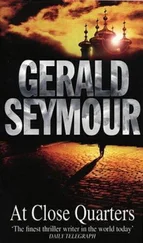Gerald Seymour - Kingfisher
Здесь есть возможность читать онлайн «Gerald Seymour - Kingfisher» весь текст электронной книги совершенно бесплатно (целиком полную версию без сокращений). В некоторых случаях можно слушать аудио, скачать через торрент в формате fb2 и присутствует краткое содержание. Жанр: Триллер, на английском языке. Описание произведения, (предисловие) а так же отзывы посетителей доступны на портале библиотеки ЛибКат.
- Название:Kingfisher
- Автор:
- Жанр:
- Год:неизвестен
- ISBN:нет данных
- Рейтинг книги:3 / 5. Голосов: 1
-
Избранное:Добавить в избранное
- Отзывы:
-
Ваша оценка:
- 60
- 1
- 2
- 3
- 4
- 5
Kingfisher: краткое содержание, описание и аннотация
Предлагаем к чтению аннотацию, описание, краткое содержание или предисловие (зависит от того, что написал сам автор книги «Kingfisher»). Если вы не нашли необходимую информацию о книге — напишите в комментариях, мы постараемся отыскать её.
Kingfisher — читать онлайн бесплатно полную книгу (весь текст) целиком
Ниже представлен текст книги, разбитый по страницам. Система сохранения места последней прочитанной страницы, позволяет с удобством читать онлайн бесплатно книгу «Kingfisher», без необходимости каждый раз заново искать на чём Вы остановились. Поставьте закладку, и сможете в любой момент перейти на страницу, на которой закончили чтение.
Интервал:
Закладка:
Isaac would see, would strip away the camouflage. And there was nothing in Mao, or Giap, or Guevera, nothing that offered solace, nothing relevant. David watched Isaac's long walk, rolling and round-shouldered, away down the street. A lone figure that skirted the few parked cars, a gesture once to a passing cyclist. David regretted his going, resented that there was no opportunity for Isaac to stay longer, to talk, to discuss, to share.
But you knew it would happen like this, David.
Not so soon, not at this time.
If anything it has been slow coming, David'
But we are not prepared…
If you shoot policemen, David…
We are in confusion, we do not hold any initiative.
Did you expect them to wait for your readiness, David?
Long strides, adrenalin spurred, he ran towards home.
At first the road followed the west bank of the Dneiper. That was the route out of the city. Then a left turn and the wide tarmac ran far and straight across the agricultural plain, passing by the occasional clusters of homes for the collective workers till the cultivated ground gave way to the forests. A dozen miles later was the bus halt to which each made their separate way. From the roadside they walked along the dirt path through the woods to the place where David had first taken them many months before.
The path led to the 'dacha' complex – neat log cabins built after the war for the Party bourgeoisie. the homes fronted on to a small lake, idyllic and beautiful and unlike anything the group had seen before; another world opened to them after the pretentiousness of the new building in Kiev.
The hut was short of the complex, reached only on foot and from a diversion from the main path, five hundred yards along an overgrown trail. Too far from the summer residences for the children of the privileged to stray upon it, and the undergrowth too thick for the adults to push their way to it in search of a remote picnic spot. Because of the density of the trees and the saplings and the bushes it would have been easy to walk straight past the single-storey building and not have noticed it.
There was no key to the door, just a piece of wood that they had propped against it and dug into the ground as a buttress to prevent the weather forcing a way in. David kicked it clear when he arrived, a savage and impatient gesture. First there, as he had wanted, and the others not due for ninety minutes, perhaps more.
This was where they had kept the policeman's pistol, up on a shelf, in a biscuit tin, but closely wrapped against the damp in a plastic bag from the vegetable market. David paced across the lone room, extracted the bag from the tin, the gun from the bag, and checked the mechanism to be certain there was no bullet in the breach. Satisfied that the gun was safe he removed the magazine from the butt. Six rounds only there. There was also the other magazine placed separately in a paper bag – thoughtful of Isaac to grab that, too: seven more shots. That meant 13 shots in all, and a pistol with an effective range of twenty metres. He should not have allowed Moses to be nominated – himself or Isaac, only they would have been capable. The girl had willed it, and he had listened to her, he did not know why. Should have ignored her, followed his instinct. He wondered why she had called for the game of chance to determine who went first, to give herself the possibility? You, Rebecca, you wanted it, sought the medal? And now catastrophe. No plan yet, only the unfamiliar feeling of helplessness, of near despair, that they had no power and that such an awesome strength was gathering its weapons with which to strike them. He thought of Moses – a cheerful, honest boy, a follower, without a mind of his own, who craved the companionship and the strength of the others, who had been asked to do one thing himself and who had not succeeded. A weak link in the chain he had set himself to forge, and when the chain snapped how long till the dogs were barking, the sirens crying in pursuit?
Isaac was next. He had travelled on the same bus as Rebecca, he in the front, she in the back, not acknowledging each other. He had hurried along the path closely flanked by the tall trees, she had dawdled. Isaac was twenty-two years old, studying chemistry. Quick, logical in his approach to problems – a 'good pupil' his professors had said when they offered him a place with a future in a government laboratory if he could acquire the right marks at the autumn examinations. He was pleased to be in front because that entitled him to hurry, and he was anxious to reach the hut because he believed he knew the solution to their problem. He had carved and chiselled it against his own self-appointed objections while scurrying across the white stone flags of the University's central precinct. As he approached the hut, using the codes of habitual caution and wariness, he thought of the reaction he would gain from David. Rarely that he was listened to. Not that it was David's fault, only that he seldom offered his opinions. He stepped on a dry branch and as the noise cracked in his ears he cursed the momentary carelessness. It was a good plan and carried the possibility of success. But he would not be the first to speak, he would hear what David had to say. He would evaluate that, and then if his own equation seemed better he would offer it. He was pleased with himself and hoped the others would be too. Not that he minded an existence in the shadow of David, not that he felt the requirement to assert himself, just that on this occasion and after his street meeting with David he had thought on the options, weighed them and was satisfied.
Rebecca came more slowly. Her flat soft-soled shoes were unsuitable for the pitfalls of the path, and her print dress caught in the brambles that trailed across the way. She had little regard for them; she too was thinking of Moses, and it was an effort for her to walk along the path such was the vividness of her image of the surroundings in which her friend was held. And he had been the nervous one, who would have wanted to be the last to shoot, and who would have fulfilled his wish if she had held her silence.
Her dark hair was swept back to the sides of her high- boned face, and pulled to the back by an elastic band before spilling pony-style to below her neck. Attractive lines on her body, small but firm breasts developed beyond the point of adolescence, tight waist, hips that swung as she walked, but all masked by the cut of the GUM store dress. But it had been cheap, and money mattered more than appearance; and since she had met David, and also Isaac and Moses, it was not appearances that were important. When David found her the 'Voice of Israel' on the radio she had listened to the programmes from the kibbutzim and thought to herself, 'Why should one need such silliness? The stupidity of frocks and dresses with raised and lowered hems and flowered prints, and waists that hug and hips that fall in flared lines: do they need those to pull a plough across new land?' A quiet and solitary person she had been before the spell of David wove close around her. He had taught her much, she believed, of the Nation State of the Jews, leaving her unaware of the vacuums of her learning. No word of those who came from Russia to the railway stations of Vienna and Amsterdam and Rome, who had won their freedom with a promise that they travelled south to Tel Aviv and instead headed west for the new frontiers of the United States. That there were Jews who left Russia and who then refused to make the final journey to Israel would have dumbfounded her. That emigration from Israel was a subject covered by rigorous censorship laws passed by the Knesset in Jerusalem would have confused her.
Sheltered and suppressed, devoid of the trappings of sophistication. A product of the undrawn but actual perimeters of the Kiev ghetto. Twenty years old, she was like the others a Jew without the faith of Judaism, taking only that part of the heritage that imbued the separateness of the race, the pride of a wandering people, and the stubbornness not to falter again as in the past. She did not attend the synagogue for the Feast of Tabernacles, nor on the Kol Nidrei night. Too great a burden her people had stumbled under, she thought, for there to be a faith that she could follow.
Читать дальшеИнтервал:
Закладка:
Похожие книги на «Kingfisher»
Представляем Вашему вниманию похожие книги на «Kingfisher» списком для выбора. Мы отобрали схожую по названию и смыслу литературу в надежде предоставить читателям больше вариантов отыскать новые, интересные, ещё непрочитанные произведения.
Обсуждение, отзывы о книге «Kingfisher» и просто собственные мнения читателей. Оставьте ваши комментарии, напишите, что Вы думаете о произведении, его смысле или главных героях. Укажите что конкретно понравилось, а что нет, и почему Вы так считаете.












